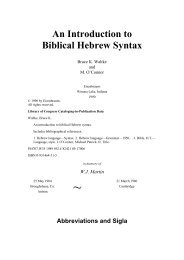a definite rule for the use of the article in the greek new testament
a definite rule for the use of the article in the greek new testament
a definite rule for the use of the article in the greek new testament
Create successful ePaper yourself
Turn your PDF publications into a flip-book with our unique Google optimized e-Paper software.
future when <strong>the</strong>y say that predicate nouns regularly omit <strong>the</strong> <strong>article</strong>, will po<strong>in</strong>t<br />
out that this is not <strong>the</strong> case <strong>in</strong> sentences <strong>in</strong> which <strong>the</strong> verb occurs, <strong>for</strong> <strong>in</strong> such<br />
sentences two-thirds <strong>of</strong> <strong>the</strong> <strong>def<strong>in</strong>ite</strong> predicate nouns have <strong>the</strong> <strong>article</strong>. Nor can<br />
this <strong>use</strong> <strong>of</strong> <strong>the</strong> <strong>article</strong> with predicate nouns be attributed to <strong>the</strong> presence <strong>of</strong> a<br />
large number <strong>of</strong> participles as predicate nom<strong>in</strong>atives <strong>for</strong> <strong>of</strong> <strong>the</strong> 214 predicates<br />
with <strong>the</strong> <strong>article</strong> only 61 are participles.<br />
The follow<strong>in</strong>g <strong>rule</strong>s may be tentatively <strong>for</strong>mulated to describe <strong>the</strong> <strong>use</strong><br />
<strong>of</strong> <strong>the</strong> <strong>article</strong> with <strong>def<strong>in</strong>ite</strong> predicate nouns <strong>in</strong> sentences <strong>in</strong> which <strong>the</strong> verb<br />
occurs (1) Def<strong>in</strong>ite predicate nouns here regularly take <strong>the</strong> <strong>article</strong> (2) The<br />
exceptions are <strong>for</strong> <strong>the</strong> most part due to a change <strong>in</strong> word-order (a) Def<strong>in</strong>ite<br />
predicate nouns which follow <strong>the</strong> verb (this is <strong>the</strong> usual order) usually take <strong>the</strong><br />
<strong>article</strong>, (b) Def<strong>in</strong>ite predicate nouns which precede <strong>the</strong> verb usually lack <strong>the</strong><br />
<strong>article</strong>, (c) Proper names regularly lack <strong>the</strong> <strong>article</strong> <strong>in</strong> <strong>the</strong> predicate, (d)<br />
Predicate nom<strong>in</strong>atives <strong>in</strong> relative cla<strong>use</strong>s regularly follow <strong>the</strong> verb whe<strong>the</strong>r or<br />
not <strong>the</strong>y have <strong>the</strong> <strong>article</strong>.<br />
In <strong>the</strong> field <strong>of</strong> textual criticism <strong>the</strong> <strong>rule</strong> here advocated has an equally<br />
<strong>def<strong>in</strong>ite</strong> contribution to make. It shows <strong>in</strong> certa<strong>in</strong> specific cases what <strong>the</strong><br />
probabilities are as to <strong>the</strong> author’s <strong>use</strong> or non-<strong>use</strong> <strong>of</strong> <strong>the</strong> <strong>article</strong>. A f<strong>in</strong>e<br />
example <strong>of</strong> this is 2 Peter 1:17, cited as an exception to <strong>the</strong> <strong>rule</strong> s<strong>in</strong>ce Wescott<br />
and Hort follow Codex Vaticanus <strong>in</strong> read<strong>in</strong>g <strong>the</strong> predicate with <strong>the</strong> <strong>article</strong><br />
be<strong>for</strong>e <strong>the</strong> verb o` ui`o,j mou o` avgaphto,j mou ou-to,j evst<strong>in</strong>. The<br />
evidence given <strong>in</strong> this study as to <strong>the</strong> extreme rarity <strong>of</strong> this construction <strong>in</strong> <strong>the</strong><br />
New Testament re<strong>in</strong><strong>for</strong>ces Tischendorf’s judgment that <strong>the</strong> variant read by<br />
practically all <strong>the</strong> rest <strong>of</strong> <strong>the</strong> MSS is to be preferred. They read <strong>the</strong> predicate<br />
after <strong>the</strong> verb with <strong>the</strong> <strong>article</strong>, ou-to,j evst<strong>in</strong> o` ui`o,j mou o` avgaphto,j<br />
mou, <strong>the</strong> usual Greek construction.<br />
But it is <strong>in</strong> <strong>the</strong> realm <strong>of</strong> translation and <strong>in</strong>terpretation that <strong>the</strong> data<br />
presented here have <strong>the</strong>ir most valuable application. They show that a<br />
predicate nom<strong>in</strong>ative which precedes <strong>the</strong> verb cannot be translated as an<br />
<strong>in</strong><strong>def<strong>in</strong>ite</strong> or a “qualitative” noun solely beca<strong>use</strong> <strong>of</strong> <strong>the</strong> absence <strong>of</strong> <strong>the</strong> <strong>article</strong> if<br />
<strong>the</strong> context suggests that <strong>the</strong> predicate is <strong>def<strong>in</strong>ite</strong>, it should be translated as a<br />
<strong>def<strong>in</strong>ite</strong> noun <strong>in</strong> spite <strong>of</strong> <strong>the</strong> absence <strong>of</strong> <strong>the</strong> <strong>article</strong>. In <strong>the</strong> case <strong>of</strong> a predicate<br />
noun with follows <strong>the</strong> verb <strong>the</strong> reverse is true: <strong>the</strong> absence <strong>of</strong> <strong>the</strong> <strong>article</strong> <strong>in</strong> this<br />
position is a much more reliable <strong>in</strong>dication that<br />
20












